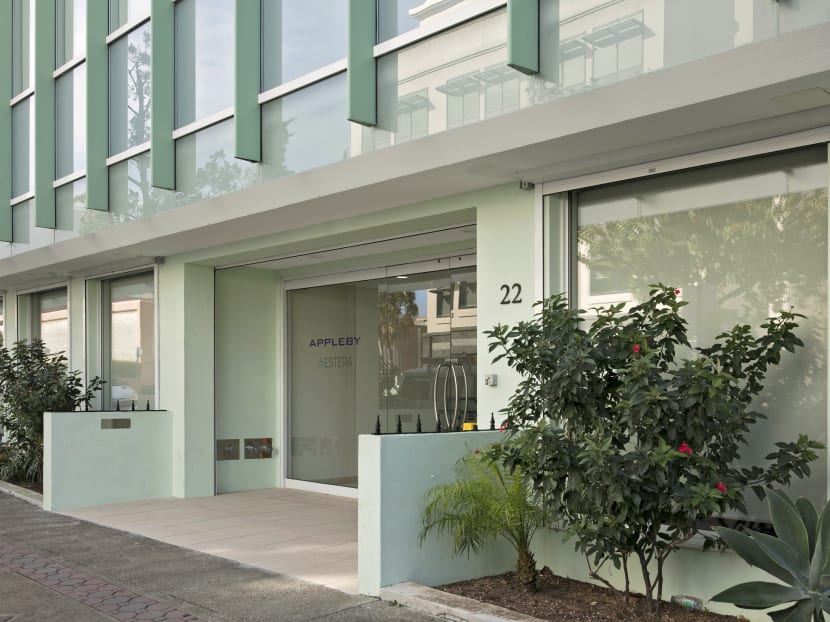Millions of leaked files in 'Paradise Papers' shine light on where the elite hide their money
NEW YORK — It is called the Paradise Papers: the latest in a series of leaks made public by the International Consortium of Investigative Journalists (ICIJ) shedding light on the trillions of dollars that move through offshore tax havens.

The offices of Appleby, an offshore law firm, in Hamilton, Bermuda, Oct 31, 2017. The core of the Paradise Papers leak, totaling more than 13.4 million documents, focuses on Appleby, a 119-year old company that has helped obscure the wealth of multinational companies and the superrich. Photo: The New York Times
NEW YORK — It is called the Paradise Papers: the latest in a series of leaks made public by the International Consortium of Investigative Journalists (ICIJ) shedding light on the trillions of dollars that move through offshore tax havens.
The core of the leak, totalling more than 13.4 million documents, focuses on the Bermudan law firm Appleby, a 119-year-old company that caters to blue chip corporations and very wealthy people. Appleby helps clients reduce their tax burden; obscure their ownership of assets like companies, private aircraft, real estate and yachts; and set up huge offshore trusts that in some cases hold billions of dollars.
The New York Times is part of the group of more than 380 journalists from over 90 media organizations in 67 countries that have spent months examining the latest set of documents.
As with the Panama Papers, the Paradise Papers leak came through a duo of reporters at the German newspaper Suddeutsche Zeitung and was then shared with ICIJ, a Washington-based group that won the Pulitzer Prize for reporting on the millions of records of a Panamanian law firm. The release of that trove of documents led to the resignation of one prime minister last year and to the unmasking of the wealth of people close to President Vladimir Putin of Russia.
The predominantly elite clients of Appleby contrast with those of Mossack Fonseca, the company whose leaked records became the Panama Papers, which appeared to be less discriminating in the business it took on. Much of the material makes for dull reading: Spreadsheets, prospectuses and billing statements abound.
But amid these are documents that help reveal how multinational companies avoid taxes and how the superrich hide their wealth. The records date back to 1950 and up to 2016.
Appleby has offices in tax havens around the world. In addition to its Bermudan headquarters, it works out of the British Virgin Islands and the Cayman Islands in the Caribbean; the Isle of Man, Jersey and Guernsey off Britain; Mauritius and the Seychelles in the Indian Ocean; and Hong Kong and Shanghai.
Americans, companies and people, dominate the list of clients. Past disclosures, such as the 2013 “Offshore Leaks” from two offshore incorporators in Singapore and the British Virgin Islands, the 2015 “Swiss Leaks” from a private Swiss bank owned by the British bank HSBC and another leak in 2016 from the Bahamas were dominated by clients not from the United States.
The documents come not only from Appleby, but also from the Singaporean company Asiaciti Trust and official business registries in places such as Bermuda, the Cayman Islands, Lebanon and Malta.
Setting up companies offshore is generally legal, and corporations routinely do so to facilitate cross-border transactions such as mergers and acquisitions. Appleby, in a public statement on Oct 24, after inquiries from ICIJ, said that it was “subject to frequent regulatory checks” in “highly regulated jurisdictions”.
“Appleby has thoroughly and vigorously investigated the allegations and we are satisfied that there is no evidence of any wrongdoing, either on the part of ourselves or our clients,” the company said.
But with this latest leak, some wealthy individuals and multinational corporations may think twice about using offshore ownership structures, said Mr Jack Blum, a lawyer who worked for decades on congressional committees investigating money transfers overseas.
“The danger of being found out has increased exponentially,” Mr Blum said in an interview. “If I were a rich guy looking to hide money offshore so that the tax man won’t get me, my nightmare would be to put it in the hands of somebody whose documents leak.”






